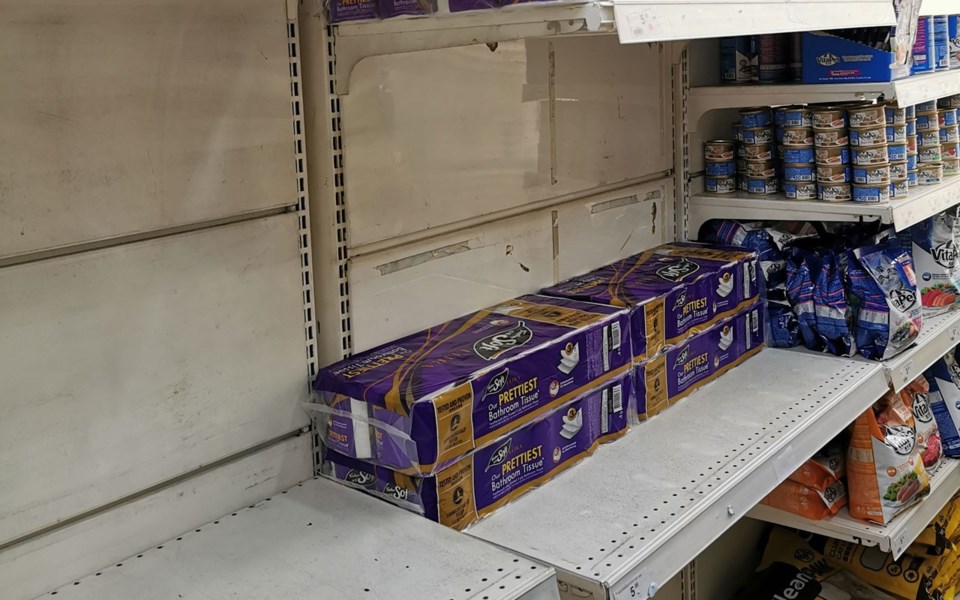"Wash your hands like you've been chopping jalapeños and you need to change your contacts."
-B.C.'s provincial health officer Bonnie Henry
It feels like we are skiing a slope and when we stop and look up, we can see a huge avalanche coming at us way off in the distance—so we feel like the risk is low, but we know that it's not going to stay that way.
So how do we get ready for COVID-19?
Well, for one thing, we need to realize that we are all in this together. Small towns like Whistler will weather this event by helping each other and supporting people who need it.
We won't survive if people go out and buy every single roll of bathroom tissue and bar of soap—everyone in town needs supplies. If you are shopping, think of all the other people who also need the same things you do.
Vancouver's international airport is reporting that it expects over a million fewer visitors to transit the facility this year.
You can be sure a goodly number of those missing travellers will be spring break tourists who have cancelled their plans to go anywhere or those not coming to B.C., even to Whistler.
We know that Richmond eateries and shops are suffering so much from people not going out that some will end up not surviving at all—and that comes with job layoffs.
Obviously, it's not sensible to be out mingling if COVID-19 is a threat, but at the same time, we need to ask ourselves what can we do to help our local businesses survive this global health storm?
Residents want to know if we are ready. Are we ready for a resident to arrive home from Italy, or Japan, or China and find they have COVID-19? Are we ready for a tourist at a local hotel to become symptomatic and unable to travel?
The short answer is that we don't know. We certainly hope we are. (I believe our health care providers are ready, but is our community?)
Yesterday, March 4, some Whistler stakeholders met to talk about just that. Obviously, direction and protocols on this have to come from the provincial ministry of health down through our local health authority, Vancouver Coastal Health, and into the community.
If you think you have COVID-19, you can call HealthLink BC at 8-1-1 to find out what to do, which would include putting yourself in isolation and reaching out to your doctor by phone to ask for next steps. If your doctor thinks you might have COVID-19, they will arrange for testing.
Travellers returning from affected areas should actively self-monitor taking a body temperature twice a day, in the morning and at night, using a digital thermometer by mouth.
It can feel alarming to read the news stories and hear of the number of deaths climbing globally, but panic won't help. If you are a healthy young person, it looks like you have little to worry about. If you are looking after elderly family members, then take extra precautions for they are the highest risk group from this coronavirus. If you have heart disease, or other underlying conditions, or work or live with those who do, you also need to be vigilant: wash your hands; keep your hands away from your eyes, nose and mouth; buy food and supplies for two weeks; and stay away from crowds. And seek help if you need it, both medical and from your neighbours.
Don't shake hands, kiss, or hug to say hello right now.
Canada has learned a great deal since we dealt with SARS in 2003 and H1N1 in 2009. Our government's health agencies speak to each other, the Quarantine Act was passed in 2005, it has increased its lab-testing capabilities, is prepared to trace people's contacts to find people who might have caught a contagious illness without knowing it, and it created the Public Health Agency of Canada for outbreaks just like this.
All of this is good, but there is no doubt that our health system is going to be sorely tested. Most emergency rooms and hospitals are already at capacity—can they handle thousands of people showing up fearing they have COVID-19? And what about looking at those who are fighting for their lives—are their enough beds for them?
According to the World Health Organization, there is now a total of 90,893 reported cases of COVID-19 globally and 3,110 deaths, as of March 3. About 3.4 per cent of reported COVID19 cases have died. By comparison, seasonal flu generally kills far fewer than one per cent of those infected—Canada saw more than 39,000 cases of influenza between 2018 and 2019. On average, it causes about 3,500 deaths each year.
So Whistler, let's be caring, prepared, informed and transparent as we face this latest test of our community strength.




